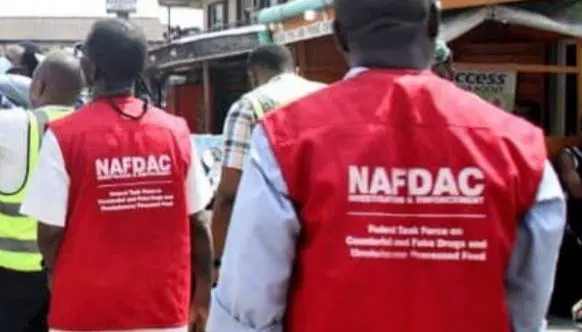🌿 Ruzu Non-Alcoholic Herbal Bitters
Ruzu Non-Alcoholic Herbal Bitters is a natural health supplement specially formulated to:
- ✅ Promote general wellness
- ✅ Detoxify the body
- ✅ Support the treatment of various ailments
Made from a powerful blend of 100% organic and medicinal herbs, Ruzu is completely alcohol-free, making it ideal for:
- 👪 All age groups
- 🌱 Health-conscious individuals
- 🌿 Anyone seeking non-alcoholic herbal remedies
Whether you're looking to boost your vitality, cleanse your system, or support healing the natural way, Ruzu Bitters offers a trusted herbal solution.
In recent enforcement operations targeting illegal drug sales in three major cities—Lagos, Onitsha, and Aba—the National Agency for Food and Drug Administration and Control (NAFDAC) disclosed that it collected N2.5 billion in fines.
When Prof. Mojisola Adeyeye, the agency’s director general, appeared before the House of Representatives Committee on Food and Drug Administration and Control on Wednesday, he revealed this information.
She explained that the sum was obtained as fines from sellers of phony and inferior pharmaceuticals in public marketplaces throughout the nation.
She explained that the official account of NAFDAC received all of the payments.
A total of N159 million had to be borrowed from a donor-funded grant to assist the enforcement actions, while N996 million of the N2.537 billion earned was utilized to carry them out.
The agency had about N206 million left over after regulatory expenses totaled an additional N1.175 billion.
According to Prof. Adeyeye, the operation, which entailed the deployment of more than 1,300 security personnel, discovered a variety of infractions, such as the selling of medications that had expired, unregistered medications, and improper storage methods.
“NAFDAC’s account was directly credited with the charges,” she stated. “We operated in Lagos, Onitsha, and Aba, spending close to N1 billion. We had to take out a donor grant for N159 million since we didn’t have enough money.
The remaining amount was just roughly N207 million after N1.175 billion was spent on regulatory activities.
She mentioned that some dealers were caught selling dangerous chemicals and prohibited medications like tramadol.
According to her, the fines were required to enforce standards and were not harsh.
Good Distribution and Storage Practice (GDSP) violations carry a default penalty of N2 million; however, in many instances, this was reduced to N500,000 in order to promote compliance.
Adeyeye expressed regret that the Federal Government’s revenue restrictions had significantly weakened the agency’s ability to maintain comparable enforcement activities.
NAFDAC had N19 billion in its account at the end of 2023, but N9 billion was taken out before the agency could access it, so only N4.5 billion was released in the end, she revealed.
NAFDAC’s 2024 operation in Kano, according to Adeyeye, was a special court-ordered intervention that was very different from the enforcement measures in southern cities.
The raid, according to her, came after a Federal High Court ruling on February 16, 2024, which ordered open drug market vendors to relocate to the recently constructed Kanawa Pharmaceutical Centre, a Coordinated Wholesale Centre (CWC).
The merchants objected. There were violent threats. They secured their stores with padlocks, but we retaliated by using more powerful locks,” she claimed.
“They were only permitted to reopen after committing to move to the regulated CWC.”
In contrast to the activities in the south, the judicial mandate and the unstable security environment in Kano prevented the collection of fines or administrative costs.
The traders were moved, and post-marketing surveillance was carried out.
She remembered, “Our accounts had just been frozen at the time and reopened at the beginning of January 2024 with a zero balance.”
“Despite the financial hardship, we had to relocate more than 1,300 stores to the regulated facility in accordance with the court’s order.”
Long before she took office, the Kano State government was the only one following the presidential directive, thus she praised them for creating the CWC.
Read Also: Insecurity Under Control, Remaining Threats Are Criminal Tendencies – Presidency Declares
However, because Lagos, Onitsha, and Aba lacked CWCs, NAFDAC was forced to investigate and punish violators in their place.
Addressing parliamentarians’ concerns over what they saw as preferential treatment of Kano traders, Adeyeye stated that the agency’s actions were motivated by the risk to personnel and the immediacy of the court’s decision.
She stated that additional charges or inspections might have been preferable in retrospect. However, things got out of control, and one of our legal officers was almost attacked.
Safety and following the court order had to come first.
The committee was also briefed by Adeniji Nma, the Director of Finance and Accounts for NAFDAC, who said that the agency can now automatically remove a sizable amount of its earnings because the Office of the Accountant-General of the Federation (OAGF) reclassified NAFDAC as a revenue-generating agency.
According to her, “since 2024, 50 percent of every payment made to NAFDAC has been withheld and sent to the federal treasury due to an order from the OAGF.”
These deductions rose to 75% by 2025. Our ability to finance our operations is severely hampered by this, particularly because the majority of our payments are service-based and closely related to inspections and other activities.
A committee member named Hon. Emeka Idu wanted a thorough, location-by-location breakdown of the money obtained from the enforcement operations after the presentation.
The committee’s chairperson, Hon. Regina Akume, deemed the presentation lacking and instructed the agency to submit a comprehensive report detailing all received and dispersed revenue, including precise numbers from every city.
“We still don’t have a complete picture of the expenditures and inflows,” she stated. “You must go back, organize your files, and return with an accurate breakdown.”
















